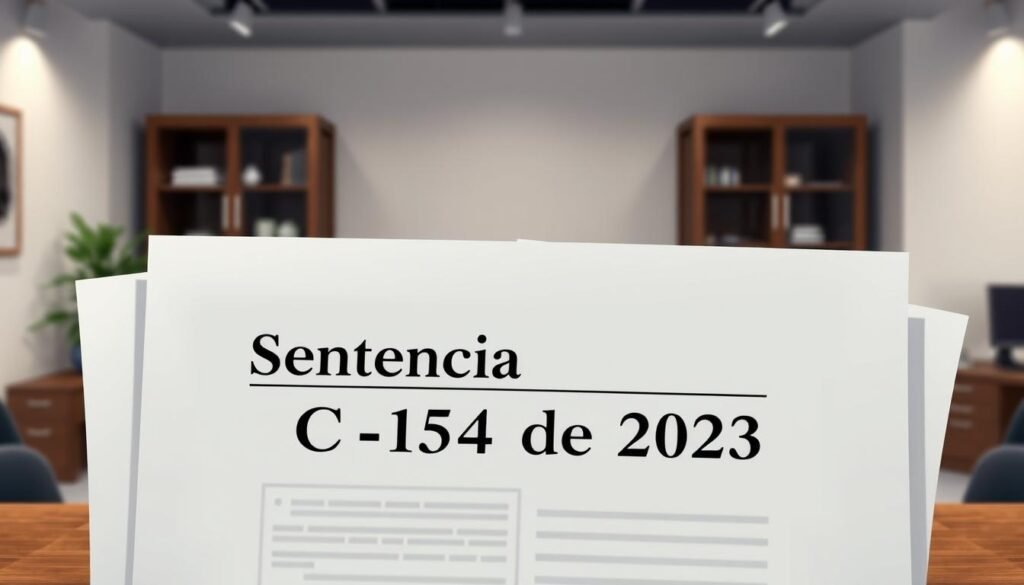Did you know that over 40% of major procurement disputes in Colombia hinge on how courts weigh the interés general against strict procedural rules? That figure reveals how court shifts reshape risks for both bidders and entidades estatales.
I advise public bodies and private bidders in Colombia on how recent Constitutional Court rulings change evaluation, sanctions, and remedies. I translate holdings like Sentencia C-154/23, C-207/19 and C-163/20 into practical steps that protect the interés público.
My work begins with a quick diagnosis of how each artículo ley affects your procurement file under the ordenamiento jurídico. I map compliance needs for administración pública units and design records so decisions survive oversight and judicial control.
In short: I help entities and naturales jurídicas align contracts, evidence, and defense strategies with the estatuto general contratación and ley 1150 frameworks to reduce liability and preserve public value.
Key Takeaways
- I convert court holdings into clear actions for bids and contracts.
- My review pinpoints documentation gaps that invite sanctions.
- Strategies focus on interés general and transparent risk allocation.
- I align operational controls with artículo ley 1150 and related rules.
- Advice covers both pre-litigation fixes and judicial defense.
News brief: why recent constitutional rulings matter for Colombia’s state contracting
I distill the Sala Plena and Corte Constitucional holdings so clients can act on procurement shifts that affect how entities buy bienes servicios and evaluate bidders.
In primer lugar, decisions like C-154/23, C-207/19 and C-163/20 changed the objeto control for selection, sanctions, and emergency rules under the ordenamiento jurídico.
My focus is practical: I map which artículo ley and provisions of the estatuto general and ley 1150 (1150 2007) the Court reviewed. I explain how the regla general and exceptions now must align with principles that rigen función administrativa and the principio igualdad.
- I identify documentation gaps and update manuals for administración pública units.
- I advise naturales jurídicas and public bodies on bid readiness and sanction management.
- I flag when presidente república powers or prior rules (e.g., sentencia c-300 2012 comparisons) influence direct contracting in emergencies.
Result: faster compliance fixes, clearer scoring matrices, and a checklist that preserves interés público while reducing litigation risk.
My role: advisory services for state contracting and sanctioning processes
I deliver practical legal and operational guidance to entities and bidders facing procurement risks in Colombia. I provide end-to-end consulting from pre-bid strategy to contentious defense.
Strategic guidance for entities and bidders
I advise entidades estatales on objective, auditable criteria that protect the interés general and resist review by the corte constitucional and oversight bodies.
Compliance, litigation support, and risk mitigation
I build sanction-response protocols from the moment an acto administrativo issues a multa or a cláusula penal becomes enforceable. I map when to activate judicial controls under Article 238 CP and the Código General del Proceso.
- I counsel personas naturales jurídicas and naturales jurídicas on bid readiness, scoring, and evidence standards.
- I align contract management with a risk register to time warnings, cure periods, and enforcement.
- I train teams to coordinate legal, technical, and financial narratives that support defense or enforcement goals.
| Stage | Primary action | Key ley reference |
|---|---|---|
| Pre-bid | Design auditable criteria; risk scoring | Artículo ley 1150; artículo ley (selection rules) |
| Contract admin | Embed controls; document performance | Contrato estatal; función administrativa |
| Sanction response | File challenges; preserve qualification | Código General Proceso; sala plena guidance |
Core legal framework: Estatuto General de Contratación and Ley 1150 de 2007
I translate the Estatuto General and Ley 1150/2007 into clear rules that govern how bids are scored and when sanctions affect eligibility. This framework sets the regla general for selection, tying transparency and free concurrence to every purchase of bienes services.
The estatuto general frames selection objetiva and libre concurrencia as mandatory pillars. I ensure tender terms and scoring matrices reflect those principles and the principios función administrativa recognized by the Corte Constitucional.
How artículo de la Ley 1150 interacts with sanctioning and scoring rules
I map which artículo ley and numeral artículo ley in 1150 2007 govern modalities, habilitation, and sanction triggers. That mapping shows when a sanction record must affect puntaje and when due process and competition require proportionate treatment.
- I show how to cite the correct artículo ley to make criteria verifiable and appeal-proof.
- I align ejecución contrato controls with fines, defaults, and cure periods to protect the interés general.
- I advise when exceptions under materia contratación and materia contratación estatal are justified without undermining equality and competition.
Principles that govern administrative function in procurement

I translate Colombia’s core procurement principles into clear steps that teams can apply at each stage of a tender.
Interés general, publicidad, economy, celerity, and transparency
The Court requires procurement to pursue the interés general while safeguarding publicidad and transparencia in decisions.
I map how those principles rigen función administrativa in planning, selection, and contract management.
Qualified good faith in state contracts
Good faith in contratación estatal demands higher diligence and openness than private deals. This standard shapes performance, enforcement, and restitution outcomes noted by the corte constitucional.
I make article-by-article checks against artículo constitución and artículo ley to ensure files prove compliance.
- I turn principios rigen función into checklists for market analysis, award justification, and documentation for bienes servicios.
- I set measurable controls for acceptance, variation, and transparency so the proceso debe ser simple and defensible.
- I stress tests workflows and prepare corrective plans when audits reveal gaps in equality or objectivity.
jurisprudencia reciente contratación estatal
This section summarizes key case outcomes and shows what entities and bidders must still do to comply.
I list the holdings that change evaluation, sanctions, and remedies while confirming the core rule of objective selection.
- C-154/23: refined score reductions and created an exception when fines face active judicial challenges.
- C-207/19: protected good-faith third parties in APP nullities and prioritized restitution where appropriate.
- C-163/20: upheld emergency direct procurement but forbade needless barriers to foreign suppliers.
What remains firm in materia contratación estatal is transparency, equality, free competition, and proportionality in scoring and sanctions.
I explain how the sala plena integrates these holdings into the ordenamiento jurídico and into practical checklists for entidades estatales.
| Change | What stays | Immediate action |
|---|---|---|
| Score exceptions for judicial challenges (C-154/23) | Objective selection criteria and verifiable puntaje | Update scoring matrices and record judicial challenge status |
| Protection for good-faith third parties (C-207/19) | Due process for sanctions and evidence-based decisions | Audit payment and restitution clauses in APPs |
| Emergency direct contracting limits (C-163/20) | Necessity, proportionality, and non-discrimination | Document necessity and remove unjustified supplier restrictions |
I recommend immediate policy updates, focused training, and a staged roadmap for naturales jurídicas and entities to sequence reforms over the next procurement cycles.
Sentencia C-154 de 2023: exception to puntaje reduction when fines are judicially challenged

C-154/23 carved an exception that pauses the automatic 2% puntaje reduction while a fine is under effective judicial control. I help clients use this path ethically and in line with the Court’s standards.
Equality and free concurrence: an intermediate test
The corte constitucional applied an intermediate principio igualdad test. Magistrado ponente josé fernando reyes found the distinction reasonable to favor free concurrence without harming the interés general.
Presumption of legality vs. access to review (art. 238 CP)
The ruling confirms that the presumption of legality of an acto administrativo coexists with judicial review under artículo constitución standards. The sala plena corte reiterated that review must remain available.
Good faith, diligence, and timeliness in activating the exception
I set a litigation calendar keyed to bid timelines so challenges are timely, diligent, and effective. Parágrafo 2 preserves consideration of antecedentes under applicable artículo ley rules.
| Action | Standard | Timing |
|---|---|---|
| File action under Ley 1437/2011 | Timely, diligent, good faith | Before award or immediately after notification |
| Verification by evaluation committee | Confirm judicial control is active | Document at bid opening and scoring |
| Record alignment | Preserve facts for ejecución contrato review | Maintain evidence and note cláusula penal effects |
I brief committees and bidders on scoring mechanics and safeguards so the exception is applied consistently across the ordenamiento jurídico and avoids opportunistic filings.
Practical implications of C-154/23 for entities and proponent strategies
I translate C-154/23 into concrete actions for bid committees, consortia partners, and compliance teams so they can apply the exception without risking transparency or the interés público.
Evaluating antecedentes under Ley 2020/2020 and RNOGI
I design checklists for entidades estatales to confirm consultations of Ley 2020/2020 and RNOGI. Committees must note registry checks in minutes and link them to any artículo ley cited.
Consortia and temporary unions: spillover of sanctions
I advise personas naturales jurídicas and naturales jurídicas on partner due diligence. If one member has sanctions, score effects can spill into a contrato estatal or bids for bienes servicios.
- I map how ejecución contrato records tie into background checks and defense narratives.
- I draft clear bidder communications and templates for minutes that record active judicial control.
| Action | Registry | Impact |
|---|---|---|
| Pre-bid registry check | Ley 2020 / RNOGI | Documented in minutes; supports artículo ley citations |
| Consortium partner vetting | Internal due diligence file | Reduces spillover risk to score and eligibility |
| Record alignment | Ejecución contrato files | Consistent narrative for sala plena and corte constitucional review |
Sentencia C-207 de 2019: APP nullity, good faith restitutions, and protection of third parties

My practice focuses on liquidations after APP annulments so third parties of good faith do not lose priority for legitimate debts. The Corte Constitucional made clear that liquidation must privilege bona fide lenders and service providers before honoring claims by bad-faith contractors.
I design liquidation matrices that separate good-faith third-party debts, contractor entitlements, and exclusions under nemo auditur to prevent enrichment without cause.
Key rules and practical steps
- I explain the objeto control and holding: protect creditors of good faith first; deny benefits to bad-faith actors and apparent third parties.
- I compute restitution to avoid double recovery by choosing either IPC indexation or legal interest for the same concept.
- I advise how cláusula penal and other sanctions affect net restitution in a contrato estatal liquidation.
| Risk | Action | Legal tie |
|---|---|---|
| Apparent third parties | Pierce veil; test good faith | Relevant artículo ley; ordenamiento jurídico |
| Double recovery | Calculate single remedy (IPC or interest) | Principles from Corte Constitucional |
| Public interest | Prioritize interés general and creditors | sala plena corte; plena corte constitucional |
I brief committees and financiers so liquidation records, supporting evidence, and cited artículo ley align with social derecho and the regla general that protects interés público.
Advisory note: structuring APP contracts and termination clauses post C-207/19
I draft APP termination clauses to protect creditors of good faith and to secure the interés general in every liquidation.
I embed priority payment rules so liquidations pay bona fide third parties before contractor entitlements. This avoids double recovery and preserves public value.
I require that ejecución contrato records must be clear. They debe ser documentary: invoices, investment proofs, dates, and interest or IPC claims.
- I align cláusula penal, penalties, and defaults with proportionality and due process to avoid later invalidations.
- I adapt templates to the Estatuto and ley 1150 and to common modes for bienes servicios and infrastructure.
- I set committee steps consistent with función administrativa duties and transparency requirements for entidades estatales.
| Item | Requirement | Purpose |
|---|---|---|
| Liquidation formula | Priority to good-faith creditors; net restitution rule | Prevent double recovery; protect interés general |
| Execution records | Invoices, timelines, payment proofs; artículo ley citations | Substantiate claims in nullity reviews |
| Enforcement clauses | Proportionate cláusula penal; cure periods; presidential/emergency contingencies | Maintain enforceability under contratación estatal norms |
I also prepare sample board resolutions that track artículo ley references and train teams on milestones, notices, and acceptance criteria that will be reviewed in any nullity scenario.
Sentencia C-163 de 2020: emergency procurement and limits on foreign participation barriers

When emergencies force rapid procurement, I guide teams to lawfully use direct contracting while preserving core public-interest safeguards.
C-163/20 validated direct contracting for urgent medical supplies but removed a rule that forced foreign suppliers to open local branches. The corte constitucional stressed temporality, necessity, proportionality, and non-discrimination.
Direct contracting in emergencies and constitutional safeguards
I show when emergency awards are permissible and how to tie necessity to the presidente república declarations. Files must document why open competition is temporarily impractical and how the acción protects the interés general.
Temporal limits, necessity, proportionality, and non-discrimination
- I design dossiers that show exit strategies back to the regla general of competitive selection and cite the correct artículo ley.
- I remove unjustified barriers to foreign suppliers to respect the principio igualdad and prevent market distortion.
- I build review gates so committees confirm that procurement still follows principios función administrativa and estatuto general contratación norms.
| Risk | Control | Reference |
|---|---|---|
| Excessive duration | Defined end date | artículo ley |
| Discrimination | Remove branch requirement | corte constitucional |
| Transparency gaps | Post-award disclosure | estatuto general |
I also advise communication plans that justify urgency to stakeholders and auditors, and I align records with the presidente república declarations so the interés general guides every decision.
For practical guidance on public procurement concepts, see contracting concept.
Sanctioning processes: multas, cláusula penal, and due process in the Código General del Proceso
I help clients respond when a multa or a cláusula penal appears in a procurement file. I map the path from the initial acto administrativo through administrative remedies to contentious control.
Lifecycle mapping: I trace notice, evidence gathering, defense timelines, and remedies so committees record each step and cite the correct artículo ley. This reduces surprises in later review.
Evidence, proportionality, and remedies
Due process matters. I ensure notices, hearings, and records comply with the código general proceso and constitutional guarantees noted by the corte constitucional.
- I design evidence strategies centered on ejecución contrato logs, communications, and technical reports.
- I require sanction decisions to be reasoned, proportional, and anchored to artículo ley citations.
- I review settlements for whether they serve the interés público or merely shift risk.
| Stage | Action | Reference |
|---|---|---|
| Imposition | Document act and notice | acto administrativo; artículo ley |
| Defense | Collect records; file remedies | código general proceso; artículo ley |
| Resolution | Settle or litigate | ordenamiento jurídico; corte constitucional |
I coordinate with procurement teams so active sanctions reflect correctly in contratación estatal procedures and so escalation governance debe ser followed before severe enforcement. For ineligibility and related rules, see ineligibility guidance.
Balancing public savings, patrimonial defense, and interest general in contracts
I help clients secure public value by balancing budgetary savings with constitutional safeguards. My work protects the treasury while keeping service continuity for bienes servicios that the state provides.
I design evaluation formulas that yield savings without sacrificing equality or objectivity. I align enforcement and remedies to defend patrimony while respecting good faith and proportionality.
I advise when negotiation or settlement better serves the interés público than prolonged litigation. I also integrate patrimonial defense with supply continuity so critical services remain uninterrupted.
- I draft internal policies for administración pública teams to operationalize constitutional principles and article-based rules.
- I lead scenario planning that tests how sanctions or terminations affect project economics and public outcomes.
- I create KPIs linking savings, service quality, and compliance with the ordenamiento jurídico and social derecho goals.
| Objective | Action | Legal tie |
|---|---|---|
| Protect treasury | Enforce remedies; prefer settlements when efficient | Artículo ley; corte constitucional guidance |
| Maintain services | Prioritize continuity for bienes servicios; contingency clauses | Sala plena standards; artículo ley |
| Transparent savings | Evaluation formulas with audit trail | Ordenamiento jurídico; contratación estatal review |
Equality in contracting: objective criteria that withstand judicial scrutiny
I create evaluation rules that survive judicial review by focusing on objective metrics and defensible distinctions.
The Court treats procurement as tied to the interés público, so evaluation must be both fair and verifiable.
I define a clear tertium comparationis for every criterion so committees compare like with like. Each score element gets a proportionality check to show why the distinction matters for goods and services.
I remove subjective or unverifiable factors and align templates with the estatuto general contratación and the regla general of open competition. Where exceptions apply, I require a written legal basis and a citation to the relevant artículo ley.
Tangible tools for committees
- I supply scoring templates that cite artículo constitución and applicable artículo ley to support legal soundness.
- I draft justification memos that anticipate review by the sala plena and the corte constitucional, including links to sentencia c-300 2012 where relevant.
- I embed cross-checks so teams apply tie-breakers and segundo lugar decisions consistently and defensibly.
| Item | Control | Purpose |
|---|---|---|
| Tertium comparationis | Defined metric | Ensure comparability |
| Proportionality check | Scoring threshold | Link score to impacto público |
| Documentation | Template + memo | Withstand scrutiny under social derecho |
Result: objective, proportional criteria that protect the interés público and open fair access for bienes servicios providers while reducing litigation risk.
For entities estatales: compliance checklists aligned with recent jurisprudence
I offer a compact compliance roadmap that helps entidades estatales verify scoring, evidence, and emergency procurement steps quickly.
Scoring rules, exceptions, and documentation standards
I codify scoring rules with clear steps to verify and document exceptions to the 2% puntaje reduction under C-154/23. Committees must confirm active judicial control, note the case number, and timestamp minutes before score adjustment.
I reference numeral artículo ley and artículo ley 1150 where applicable. Each checklist entry cites the exact artículo ley to support decisions and to satisfy oversight reviewers.
- Run RNOGI and Ley 2020/2020 checks and record results in minutes.
- When a fine is contested, document judicial filings and verification before applying score exceptions.
- Unify evidence standards for multas, desempeño, and judicial filings in the procurement file.
- Update APP termination templates to prioritize good-faith creditor payments on nullity.
- For emergency purchases, require written necessity, defined temporality, and anti-discrimination rationale per C-163/20 principles.
- Align minutes and resolutions with cited artículo ley references for legal defensibility.
| Checklist area | Mandatory step | Legal tie |
|---|---|---|
| Background checks | RNOGI + Ley 2020/2020 entry recorded in minutes | Artículo ley 1150; registry rules |
| Score exception | Confirm active judicial control; attach filing proof | Numeral artículo ley; C-154/23 application |
| APP termination | Liquidation matrix; priority payments to bona fide creditors | C-207/19; artículo ley references |
| Emergency procurement | Necessity memo, end date, non-discrimination note | C-163/20; artículo ley |
I also deliver training modules and audit-ready file structures so equipos can apply these lists consistently. Every checklist item links a practical step to an artículo ley citation and to interest general considerations that must be recorded in award decisions.
For personas naturales y jurídicas: bid readiness and litigation calculus
I prepare bidders to weigh litigation risks against award timing so they can protect scores without sacrificing contract delivery. My focus is practical: decide fast, file cleanly, and keep evidence airtight.
When to challenge fines and how it affects evaluation
I assess whether and when to challenge an acto administrativo imposing fines to trigger the C-154/23 exception on score reductions. I map filings to bid calendars and test if the judicial control will remain active by award time.
I plan filings and evidence that meet diligence and good faith thresholds. I model scoring scenarios under different timelines so you see the trade-offs before you commit to litigation.
- I align bid files with artículo ley requirements to prevent formal disqualifications.
- I advise on partnering choices for consortia to limit spillover from sanctioned members.
- I verify antecedents and background records so selection committees address history under Ley 2020/2020.
| Action | Why it matters | Timing |
|---|---|---|
| File prompt judicial challenge | Can suspend 2% puntaje reduction | Before award or immediately after notification |
| Document judicial control | Evaluation committees rely on proof | Attach case number in minutes |
| Partner vetting | Reduce spillover to bid score | Pre-bid due diligence |
I brief clients on impacts under the constitución política and link strategy to ley 1150 and 1150 2007 modalities. For a clear primer on the basics of public procurement see contratación pública.
My consulting approach to contentious risks and sanctioning defenses
I help clients anticipate sanction risks by linking contract milestones to legal stopgaps. I focus on early warning, clear evidence files, and settlement options that protect the interés general.
Early warning and evidence strategy: I build monitoring tied to ejecución contrato milestones so teams detect breaches before notices issue. I assemble documentary packs that cite the exact artículo ley and meet tribunal expectations.
Settlement design and drills
I design settlement frameworks that prioritize public value while reducing exposure. I run mock drills, update playbooks with sala plena and corte constitucional trends, and stage internal responses so teams act in primer lugar.
- I align tactics with general contratación administración realities and governance paths.
- I simulate litigation positions focused on equality and due process challenges.
- I keep post-matter reviews to improve controls and training.
| Focus | Action | Outcome |
|---|---|---|
| Detection | Milestone triggers | Faster remedial steps |
| Evidence | Artículo ley citations | Stronger defense |
| Settlement | Calibrated offers | Protect interés general |
Conclusion
I summarize how recent Court guidance requires clearer records, measured remedies, and competitive fairness for public procurement.
I show how the corte constitucional and the constitución política modernized the balance between sanctions, emergencies, and restitution while protecting the interés general.
First, entities and bidders must anchor decisions in cited artículo ley and in the ordenamiento jurídico. Second, the regla general of open competition remains, with narrow exceptions that courts will test in objeto control reviews.
I stress rigorous ejecución contrato records, alignment with ley 1150 / 1150 2007 and the estatuto general contratación, and leadership when the presidente república invokes emergency measures.
In primer lugar, document every step. En segundo lugar, design lawful, proportionate remedies. Contact me to embed these standards across bids for bienes y servicios and for sustained compliance and competitive success.

